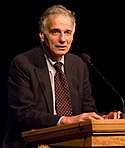Ralph Nader Quote
President Reagan was elected on the promise of getting government off the backs of the people and now he demands that government wrap itself around the waists of the people.
Ralph Nader
President Reagan was elected on the promise of getting government off the backs of the people and now he demands that government wrap itself around the waists of the people.
Tags:
government
Related Quotes
Let my silence grow with noise as pregnant mothers grow with life. Let my silence permeate these walls as sunlight permeates a home. Let the silence rise from unwatered graves and craters left by bomb...
Kamand Kojouri
Tags:
abuse, abused, activism, activism poems, activist, amnesty, bellies, bombs, broken hearts, coming together
The downfall of the attempts of governments and leaders to unite mankind is found in this- in the wrong message that we should see everyone as the same. This is the root of the failure of harmony. Bec...
C. JoyBell C.
Tags:
color, culture, difference, differences, equality, government, harmony, human, humanism, humanity
The global population of Earth are involved in the following corporate government experiments: The long term effects of - 1. Nuclear bomb fallout radiation. 2. Man-made wireless radio frequency (RF) r...
Steven Magee
Tags:
abnormally, adaptation, aircraft, airplanes, atmosphere, atom, bodies, bomb, chemical, chemtrails
About Ralph Nader
Ralph Nader (; born February 27, 1934) is an American lawyer and political activist involved in consumer protection, environmentalism, and government reform causes. He is a perennial presidential candidate. His 1965 book Unsafe at Any Speed, which criticized the automotive industry for its safety record, helped lead to the passage of the National Traffic and Motor Vehicle Safety Act in 1966.
The son of Lebanese immigrants to the United States, Nader attended Princeton University and Harvard Law School. He quickly developed an interest in vehicle designs that were hazardous and contributed to elevated levels of car accidents and fatalities. Published in 1965, Unsafe at Any Speed became a highly influential critique of the safety record of American automobile manufacturers, focusing on General Motors' (GM's) Corvair automobile in particular.
Following the publication of Unsafe at Any Speed, Nader led a group of volunteer law students—dubbed "Nader's Raiders"—in an investigation of the Federal Trade Commission, leading directly to that agency's overhaul and reform. In the 1970s, Nader leveraged his growing popularity to establish a number of advocacy and watchdog groups including the Public Interest Research Group, the Center for Auto Safety, and Public Citizen. Two of Nader's most notable targets were the Chevy Corvair and the Ford Pinto.
Nader made four bids to become President of the United States, running with the Green Party in 1996 and 2000, the Reform Party in 2004, and as an independent in 2008. In each campaign, Nader said he sought to highlight under-reported issues and a perceived need for electoral reform. He received nearly three million votes during his 2000 candidacy, but also stirred controversy over allegations that his campaign helped Republican candidate George W. Bush win a close election against Democratic candidate Al Gore. In 2006 The Atlantic Monthly, calling Nader one of the hundred most influential Americans in history, said, "He made the cars we drive safer; thirty years later, he made George W. Bush the president."
A two-time Nieman Fellow, Nader is the author or co-author of more than two dozen books and was the subject of a documentary film on his life and work, An Unreasonable Man, which debuted at the 2006 Sundance Film Festival. He has been repeatedly named to lists of the "100 Most Influential Americans", including those published by Life, Time, and The Atlantic. The New York Times described him as a "dissident".
The son of Lebanese immigrants to the United States, Nader attended Princeton University and Harvard Law School. He quickly developed an interest in vehicle designs that were hazardous and contributed to elevated levels of car accidents and fatalities. Published in 1965, Unsafe at Any Speed became a highly influential critique of the safety record of American automobile manufacturers, focusing on General Motors' (GM's) Corvair automobile in particular.
Following the publication of Unsafe at Any Speed, Nader led a group of volunteer law students—dubbed "Nader's Raiders"—in an investigation of the Federal Trade Commission, leading directly to that agency's overhaul and reform. In the 1970s, Nader leveraged his growing popularity to establish a number of advocacy and watchdog groups including the Public Interest Research Group, the Center for Auto Safety, and Public Citizen. Two of Nader's most notable targets were the Chevy Corvair and the Ford Pinto.
Nader made four bids to become President of the United States, running with the Green Party in 1996 and 2000, the Reform Party in 2004, and as an independent in 2008. In each campaign, Nader said he sought to highlight under-reported issues and a perceived need for electoral reform. He received nearly three million votes during his 2000 candidacy, but also stirred controversy over allegations that his campaign helped Republican candidate George W. Bush win a close election against Democratic candidate Al Gore. In 2006 The Atlantic Monthly, calling Nader one of the hundred most influential Americans in history, said, "He made the cars we drive safer; thirty years later, he made George W. Bush the president."
A two-time Nieman Fellow, Nader is the author or co-author of more than two dozen books and was the subject of a documentary film on his life and work, An Unreasonable Man, which debuted at the 2006 Sundance Film Festival. He has been repeatedly named to lists of the "100 Most Influential Americans", including those published by Life, Time, and The Atlantic. The New York Times described him as a "dissident".
